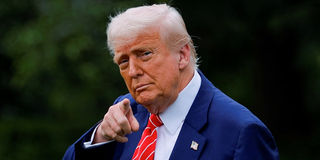
US President Donald Trump gestures, as he departs for Pennsylvania, on the South Lawn of the White House in Washington, DC on May 30, 2025.
The Donald Trump administration has inched closer to starting to take away, on average, more than Sh3 billion of the cash sent home annually by Kenyans in America after Congress enacted a new tax on remittances.
The Republican-dominated Senate on Thursday voted for a one per cent excise tax on remittances, or international money transfers, from the world’s largest economy, with President Trump signing the Bill into law on Friday.
The duty on money migrants send home to their families is part of a controversial budget package and spending cuts contained in what the President referred to as ‘One Big, Beautiful Bill’
Mr Trump immediately termed the passage of the Bill in the House as “a phenomenal victory”.
"I've never seen people so happy in our country because so many different groups of people are being taken care of: the military, civilians of all types, jobs of all types," Trump said at the signing ceremony on July 4, thanking House Speaker Mike Johnson and Senate Majority Leader John Thune for leading the Bill through the two houses of Congress.
"So you have the biggest tax cut, the biggest spending cut, the largest border security investment in American history," Trump said.
While the original clause in the Bill sought to tax money sent back by non-US citizens to other countries, the enacted version applies to all remittance senders transferring cash through banks, money transfer services such as Western Union and MoneyGram, and other formal channels.
The original Bill had also proposed a higher tax of five per cent of the cash being transferred, but this was slashed to 3.5 percent by the House of Representatives and 1.0 per cent by the Senate.
President Trump’s signing of the Bill on Friday paved the way for a tax on outbound money transfers to be enforced from January 2026.
This will be the first time the US has enforced a national remittance tax, a move likely to hit hundreds of households in Kenya, and millions across the globe, who depend on their American-based families and friends for money. For many people in Kenya, the money is spent on basic needs like buying food and household goods or paying medical bills and school fees.
“It is good that it [remittance tax] has come down (from the original proposal), but still it is going to affect us. The Trump administration is a threat to multilateralism. We are living in very dicey times,” Dr Shem Ochuodho, the global chairman of Kenya Diaspora Alliance (KDA) and President of the Africa Diaspora Alliance, said in an interview.
“My only hope is that with the upcoming mid-term elections, more Democrats could be elected to the House and reverse it.”
More than 100,000 Kenyans working and living in the US are the largest source of remittances into Kenya, accounting for 53.17 per cent of $4.95 billion (about Sh639.74 billion) flows last year.
Diaspora remittances from the world’s largest economy amounted to $2.63 billion (about Sh339.90 billion) last year, according to data from the Central Bank of Kenya.
This means the Trump administration will take in upwards of $26.30 million (about Sh3.40 billion) in remittance excise tax from Kenyans in the US, even if we assume the figure will remain constant.
International tax experts said the remittance tax goes against economic principles and canons of taxation by applying it on the quantum of money transferred rather than the transfer fee.
Hadijah Nannyomo — a partner for international trade and indirect taxes at tax consultancy and business advisory firm EY — said most countries charge repatriation taxes on incomes from businesses and on dividends through withholding tax.
Money remittances in other countries are also taxed indirectly through the service charges that financial institutions charge, she added.
“The reduction in the tax (from initial 5.0 to 1.0 per cent) was a smart move as it enhances compliance and broadens the tax base,” Ms Nannyomo said. “But depending on the amounts remitted and calibre of senders, it could still be considered high. For foreign students, for instance, this may still be high.”
She added: “Those affected could consider available exemptions to make remittances such as card payments and credit unions.”
The tax will hit Kenyans with permanent resident status in the US (Green Card holders), those employed by American firms (under H1-B visa), Kenyans employed by multinationals which send them to work at a branch or unit in the US on a temporary basis (holders of L1 visa) and Kenyan students in the US under F-1 visa.
Dr Ochuodho said the tax goes against the UN’s Sustainable Development Goals and the Global Compact for Safe, Orderly and Regular Migration, which targets to lower the cost of money transfer to 3.0 per cent.
Remittance service providers such as Western Union or MoneyGram, banks, and money transfer apps, he says, currently charge nine per cent to wire money to Kenya, fees which will go up upon enforcement of the new tax from next year.
“This may push the Kenyan diaspora in the US to alternative channels. Remember tax evasion is illegal but tax avoidance isn’t. So some people will likely move to cryptocurrencies—and the world is moving towards that direction.”
Proceeds from the remittance tax, unofficially projected at about $10 billion (Sh1.29 trillion), are earmarked for enforcing measures to curb illegal immigration and tightening border security.





